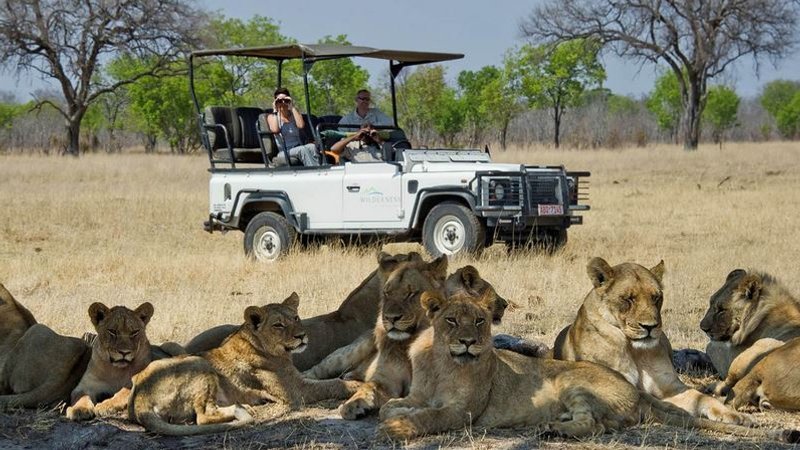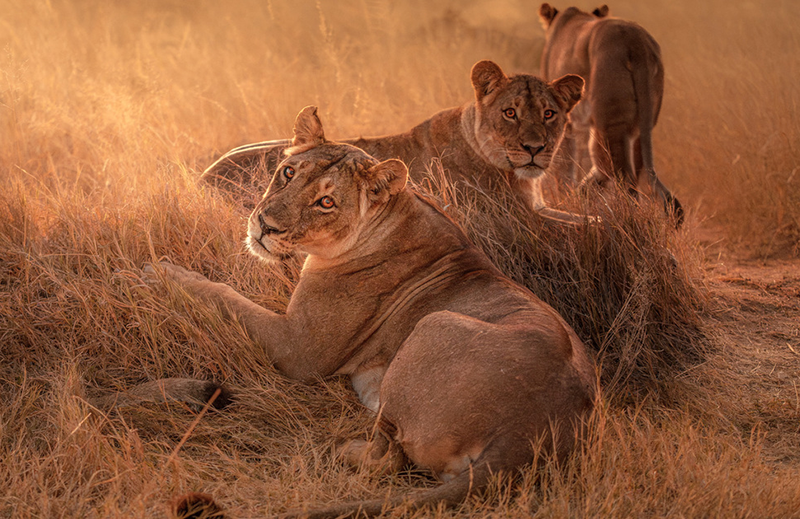- Featured
- No Comment
Safari surge for Zimbabwe’s Hwange National Park as international arrivals pick up

After years of being overshadowed by its neighbours, Zimbabwe is firmly back on the safari map. International arrivals are surging — air travel to Zimbabwe jumped 171% in 2024, according to the latest World Tourism Barometer by UN Tourism — and exciting new lodges will be opening throughout 2025. Tourism receipts have also increased by 22%.
Safari tourism directly funds wildlife protection in Zimbabwe’s state-owned reserves, covering operational costs and anti-poaching initiatives. Nowhere is this impact more evident than in Hwange National Park, Zimbabwe’s largest natural reserve and home to one of Africa’s greatest concentrations of elephants. After decades of poaching threats, reports indicate that no elephants have been killed since 2021 — an extraordinary achievement made possible through sustainable-tourism revenue.
With improved infrastructure and growing investment in high-end safari experiences, Hwange is well positioned for a surge in popularity among American travellers seeking exclusivity, conservation-driven tourism and untamed wilderness.
Johnny Prince, co-founder of Timbuktu Travel, highlighted how this resurgence benefits both conservation efforts and local communities. “The local people in Zimbabwe and their hospitality on the ground has always been incredible – it’s so exciting to see this growth in tourism which will have a huge impact in terms of local communities and continued conservation efforts,” Prince said.
Timbuktu Travel has reported a 10% increase in bookings to Zimbabwe year over year alongside a 20% rise in passenger numbers, a strong indicator that demand for Hwange safaris is building within U.S. markets.
Coming soon: Muddy Teak
One of Hwange’s most anticipated launches is Muddy Teak, an exclusive-use camp from Wild Expeditions set to debut on May 1. Located beside a permanent waterhole that attracts large elephant herds as well as sable antelope and members of Hwange’s famed Supermodel Pride (one lioness gave birth just meters from camp last year), Muddy Teak offers world-class wildlife viewing straight from its private deck.
According to Wild Expeditions, guests at Muddy Teal have full control over their experience, free from rigid safari schedules. If lions start roaring nearby during dinner or if jackal alarm calls signal an approaching predator, guests can abandon their meal and head out into the night for an impromptu game drive.
Guests can also spend time relaxing under towering teak trees or spending hours quietly observing elephants from one of Muddy Teak’s logpile hides. Unlike traditional hides, logpile hides create an entirely different dynamic. Guests sit low to the ground behind stacked logs while towering elephants drink nearby, fully aware — but unbothered — by human presence.

Game drives are central at Muddy Teak, Wild Expeditions said, with open vehicles offering close-up encounters with lions, wild dogs and other species. Walking safaris, led by highly trained Zimbabwean professional guides alongside skilled trackers, add another dimension. These walks reveal smaller yet equally fascinating details: tiny animal tracks, medicinal plants and birdsong changing subtly when predators lurk nearby. Guests also have access to night drives and spontaneous tracking sessions.
With just four guest tents, including one family unit, Wild Expeditions said Muddy Teak ensures exclusivity without compromising flexibility or immersion, making it ideal for travelers seeking an authentic yet comfortable bush experience.
The Elephant Express
For those looking beyond traditional game drives, The Elephant Express, operated by Imvelo Safari Lodges, offers a unusual way to enter the heart of Hwange National Park before arriving at Camelthorn Lodge. Launched in late 2014, The Elephant Express provides a scenic alternative transfer between Dete Siding (near the entrance to Hwange National Park) and Ngamo Siding.
Rather than enduring long road transfers, guests board a custom-built rail safari car and embark on a slow, immersive journey across vast landscapes, spotting elephants, kudus, wildebeests and even prides of lions along the roughly two-hour trip. Drinks and snacks are served along the way.

Once guests step off The Elephant Express, they’re only minutes away from Camelthorn Lodge, located on the southeastern edge of Hwange near Ngamo Forest — an area known for exceptional wildlife sightings year-round.
Beyond Muddy Teak and Camelthorn Lodge, Somalisa Camp remains one of Hwange’s best-loved properties, known for elephants frequently drinking near its plunge pools. Somalisa blends high-end comfort with sustainability–$85 per guest goes directly toward conservation projects.
For travelers looking for a deeper connection with the landscape beyond wildlife, Hideaways’ Bumbusi Wilderness Camp offers a rare opportunity to explore the ancient Bumbusi Ruins, believed to date back to the ninth century. Guided tours enable visitors to learn about the site’s historical significance.
The best time to visit Hwange is during the dry season (May to October) for optimal wildlife viewing. Access is typically through Victoria Falls Airport (VFA) followed by a road transfer or the Elephant Express rail journey.
The park’s accessibility from Victoria Falls makes it easy to combine with other southern African destinations, while its uncrowded wilderness offers the exclusivity that many luxury clients seek.
